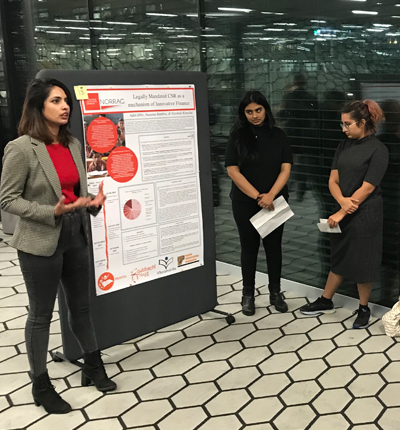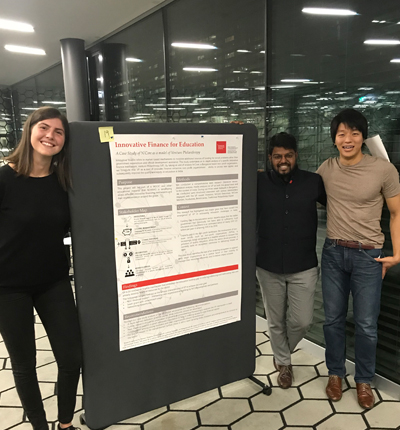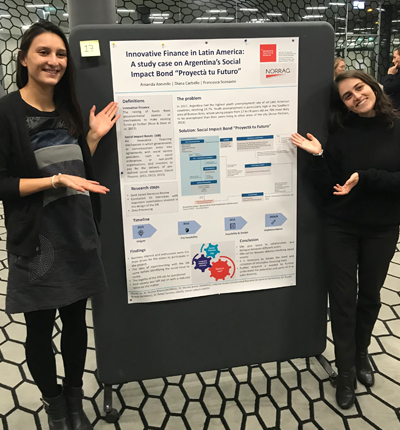Innovative Financing for Education Case Study Research: Partnership between NORRAG and IHEID Interdisciplinary Masters
Last year, NORRAG had the opportunity to partner with The Graduate Institute of International and Development Studies (IHEID) to engage Master in Development Studies’ students in conducting desk and field research as part of their Capstone Projects.
The Capstone projects are part of IHEID Interdisciplinary Master’s curricula. They constitute an opportunity for partners to engage in a research project with the next generation of international and development professionals and for graduate students to work with International Geneva organizations to conduct research on today’s global challenges.
Building on NORRAG’s work in the area of Innovative Financing for Education (IFE), three groups of Master students conducted extensive desk and field research on case studies about how innovative financing mechanisms in education are designed and implemented. Emblematic cases in India and in Argentina were investigated. A first group studied the Indian legally mandated CSR as a mechanism of IFE through the case of Wipro Foundation. Also looking into the Indian context, a second group investigated the case of N/Core, a non-profit organization which employs the innovative financing mechanism of Venture Philanthropy (VP). A third group explored the case of Proyecta tu Futuro, the first Social Impact Bond (SIB) experience in Argentina.
Until the case studies are published, learn more about these experiences and the research conducted by these promising groups of researchers through their own words.
WIPRO: Understanding legally mandated Corporate Social Responsibility as a mechanism of innovative financing for education by Aditi Dhir, Sunaina Bambra, Vaishali Kotecha
1) What was your Capstone project about?
During this research, we focused on understanding the role of legally mandated Corporate Social Responsibility (CSR) in India as a mechanism of Innovative Financing for Education. As per the Companies Act 2013, companies with a net worth USD 70 million and above or with a revenue of USD 140 million and above are required to spend at least 2% of their average net profits made during the three immediately preceding financial years on social good (Ministry of Corporate Affairs, 2013). Our study aimed to analyse whether this mandate was able to tap into the quality and funding gap within the Indian education sector by raising new and innovative sources of funding. Within the ambit of the mandate, we studied the activities of Wipro Foundation, one of the leading CSR foundations in the education space in the country.
2) Why did you choose to do your Capstone with NORRAG on the topic of IFE?
Considering the paucity of research within the scope of Innovative Financing, especially in India, carrying out research on IFE seemed like an excellent opportunity with NORRAG. When we began our research on CSR as a mechanism of Innovative Financing for education, and realized there was a lot of scope to develop evidence-based study that would be helpful for future researchers and entrepreneurs. NORRAG, known to be one of the leading networks in education, especially in Switzerland, provided us with stellar training and means to carry our research out. We realised that the learning curve gained from this study was immense and the training acquired, from NORRAG, was a necessity in exceling our study.
3) ‘What were the lessons learned during your research? Did you acquire any new skills?
We found that mandating CSR led to a definitive increase in the flow of funding within the not-for-profit education space. However, most of this funding was not well guided and often focused on providing educational infrastructure.
All in all, we found that it was too soon to tell whether mandating CSR had been effective or not. The case in point of Wipro shows us that CSR, when done from within, has the potential to bring private actors as partners in social development and support the improvement of quality of education system in India. However, this is dependent on the grit of the CSR firms to create impact.
The completion of this project deepened our understanding of the role of appropriate funding mechanisms in creating developmental impact. As we progressed with our findings and the study, we sustained a working partnership with Wipro as well as with NORRAG. Academically, we acquired strong qualitative skills as we analysed multiple studies for the completion of our research. This instilled the importance of strategically using data for development research. Additionally, prioritising our research and managing a positive team dynamic was an essential part of the process that paved the way for achieving consistency.

N/Core: A case study of venture philanthropy to support education in India by Dhiman Talapatra, Karun Gopinath, Ludovica Tramontin and So Nakayama
- What was your Capstone project about?
We focused on Venture Philanthropy (VP) as a mechanism of innovative financing – particularly, its role in bridging the funding gap in the Indian education landscape. We conducted an extensive review of the literature on the subject from a global and local lens, highlighting knowledge gaps on the functioning of the mechanism, both theoretically and practically. Specific to the Indian context, two main gaps were identified. First, a massive funding gap hindering equal access to quality education by 2030. Second, major gaps within the non-profit ecosystem, specifically in terms of lack of access to initial capital and capacity-building opportunities among early-stage non-profit organizations working in the Indian education space, thereby precluding the delivery of impact at scale. The NORRAG-supported field visits to Bangalore allowed us to conduct an in-depth analysis of the structure and overall functioning of N/Core, a non-profit organization which employs a VP model, thereby making it the unit of analysis. In practice, N/Core incubates early-stage non-profit organizations over six months, during which period the latter receives a significant, unrestricted seed fund, along with strategic support from mentors from the development and corporate sectors, allowing them to develop their capacity to deliver impact at scale. During our stay in India, we interviewed different stakeholders associated with the VP model: investors, N/Core Staff (as the VP practitioners), N/Core mentors, incubatees (early-stage non-profits), and beneficiaries of the interventions run by the latter. In the months following the fieldwork, we worked on gathering and analysing the data collected, followed by drafting a case study on the VP model, using N/Core as the primary unit of analysis.
- Why did you do your Capstone with NORRAG on the topic of IFE?
As a group of students passionate about the education sector, we found our interests to be highly aligned with NORRAG’s vision and mandate. The holistic understanding of the field, together with the efforts that NORRAG is making into bringing voices from the Global South into the academic discourse, presented an exciting opportunity for us. In addition, innovative financing has gained momentum at a rapid pace over the past few years owing to the increasing acknowledgement of the need to mobilise additional resources to reach various national and global benchmarks, including SDG 4.
- What were the lessons learned during your research? Did you acquire any new skills?
These nine months have been challenging at various levels, but also extremely rewarding. First, most of the work between the four team members had to be accomplished remotely with considerable time differences. This, combined with significantly varying working and writing styles, presented a challenge. For every deadline, we learned how to distribute the work among ourselves, discuss it, and eventually collate it into a single, cohesive document. Through the process, we started identifying the strengths and weaknesses of every member of the group, and towards the end, we knew each other inside-out. Therefore, working as a team is the primary and arguably the most important takeaway from this experience.
Through the experience, we developed a deep understanding of how qualitative research should be conducted. From undertaking secondary research and elaborating interview protocols for every stakeholder, to interviewing the different actors and analysing the data collected, we gained hands-on experience on framing a successful case study. A major part of this process was understanding and incorporating feedback from our supervisors, Dr. Terway and Dr. Steiner-Khamsi, since it was a crucial element in polishing the quality of our case study as well as our own research. In particular, we gradually developed our critical-thinking abilities, learning to back up every statement with reliable evidence. This has already proved to be useful for our professional careers. Thirdly, we learned how to manage our time as efficiently and effectively as possible. In addition to this 9-credit project, each team member had their own priorities – taking other courses or interning at different places. Therefore we were forced to manage our time according to others’ commitments. We are very grateful to the Graduate Institute of International and Development Studies for giving us the opportunity to partner with NORRAG for this exciting and incredibly enriching Capstone project.

Proyecta tu Futuro: A case study of a Social Impact Bond for employability training in Buenos Aires by Amanda Azevedo, Diana Carballo and Francesca Scanavini
1) What was your Capstone project about?
Our research comprised a case study about Proyecta tu Futuro, the first Social Impact Bond (SIB) developed in Argentina (and one of the first in Latin America). In order to document this new initiative, an agreement was made between NORRAG, the Government of Buenos Aires, and the Graduate Institute, Geneva. We conducted interviews in Buenos Aires and electronically with different stakeholders involved in the design process of the SIB. Our goal was to document how Proyecta tu Futuro includes perspectives from the government, the investors, technical assistants, and service providers. Our hope with this project is that the analysis of Proyecta tu Futuro will serve to further highlight some of the significant challenges and opportunities for the design of SIBs internationally, and will provide useful and necessary information to learn how innovative financing (IF) mechanisms are being implemented in the Latin American context.
2) Why did you choose to do your Capstone with NORRAG on the topic of IFE?
NORRAG gave us the opportunity to understand the contemporary alternatives to financing public services in an era of public constraints. We had the opportunity to conduct field research, interviewing the main actors who created Proyecta tu Futuro, in order to understand their rationale. We gained a holistic understanding of the challenges faced and the opportunities created by Proyecta tu Futuro through a multi-lens approach. This knowledge will be essential to our academic and professional trajectories.
3) ‘What were the lessons learned during your research? Did you acquire any new skills?
Our Capstone Project gave us the opportunity to conduct desk-research. We carried out a national and regional literature review and an analysis of media, enabling us to improve our research, analytical and reporting skills. Moreover, thanks to the project we all improved our professional writing skills.
Because of the fieldwork opportunity in Buenos Aires, we strengthened our qualitative skills by conducting interviews with the stakeholders. Conducting semi-structured interviews in order to collect useful data improved our Spanish skills and taught us to communicate in a professional way. We also had the opportunity to research to the topic of innovative financing in the field of education, a topic that has yet to be researched extensively, but that is fundamental to the world that we live in.
The project enabled us to reinforce several soft skills, including our ability to work in a group, to coordinate, to adapt, to be open to others’ ideas and to be able to express our own opinions in an efficient and clear way. We enhanced our skills of teamwork, active listening, adaptability, leadership and adopting a professional attitude in a multicultural environment.


